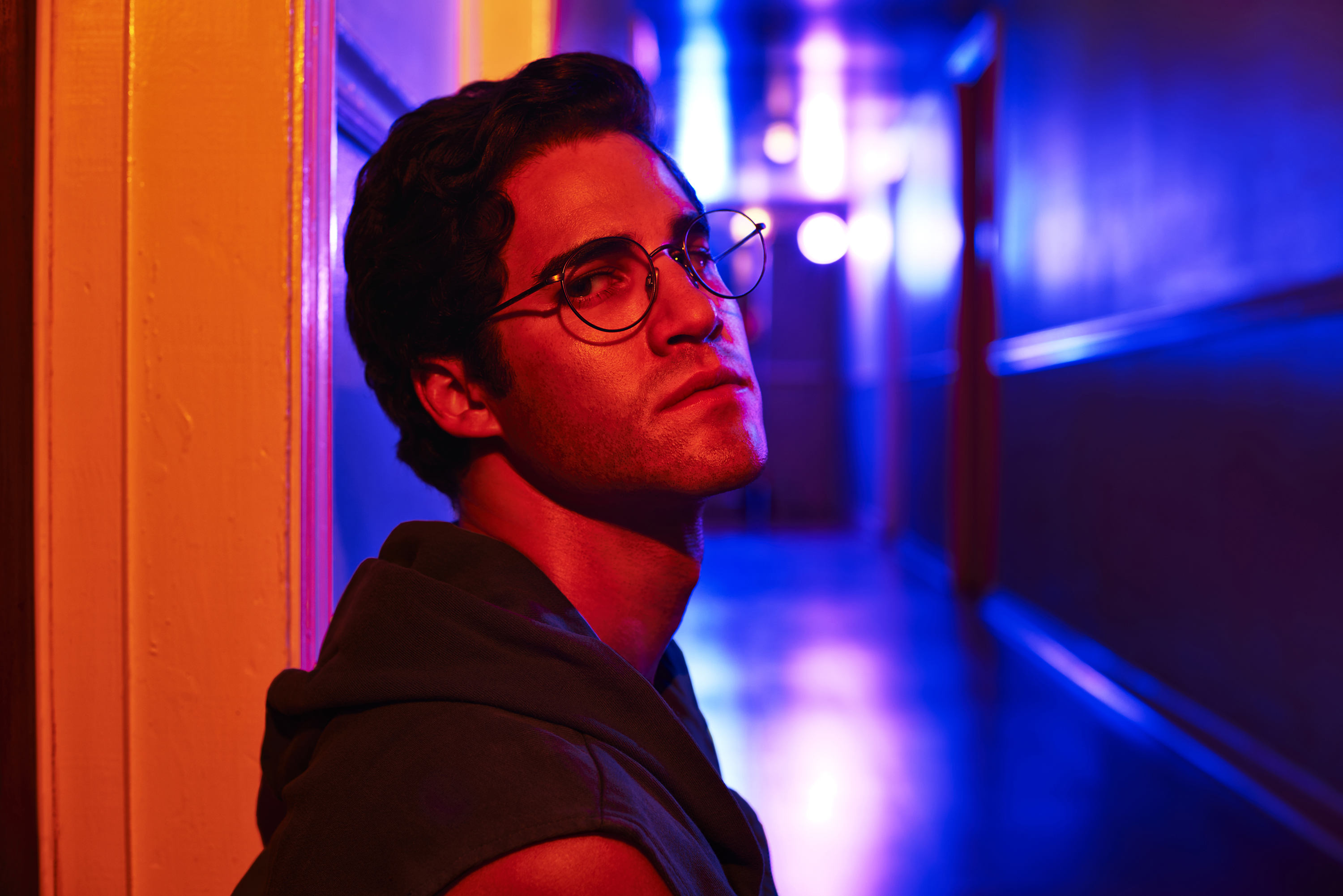Rather than offering standard gore and merely giving us the willies, The Assassination of Gianni Versace, Ryan Murphy’s second installment of American Crime Story on the FX channel (now available on Amazon Prime Video and ITunes), is one of the rare serial killer dramas genuinely interested in sexual mores, complex character, spiky history, and salient issues of class. Demanding, sometimes confounding, but nevertheless searing and absorbing, the series piles on layer after layer of pain, irony, and god-awful coincidence, its counter-clockwise structure designed to take us deeper and deeper into a human abyss.
Andrew Cunanan, the elusive Minotaur at the heart of this real-life ’90s labyrinth, is a deadbeat on the lam, a name-dropping, designer-obsessed social climber. On a tried-and-true procedural-thriller level, the limited series, chronicling the curly-haired monster sacré’s notorious murder spree and suicide, sheds light on the largest failed manhunt in U.S. history—a fascinating botch, the whole law enforcement fiasco resulting from rampant homophobia and pure incomprehension regarding “a gay parallel universe,” as Vanity Fair reporter Maureen Orth labels it in Vulgar Favors, her juicy recounting of the roller-coaster case. Another key factor is the homicidal young con man Cunanan’s startling ability to evade the cops. A wizard at blithely rearranging his Filipino-Sicilian heritage to suit his gold-digging needs, Cunanan could blend with chameleon ease into different communities—Italian, Greek, Latino, Asian, etc.—as “a multi-purpose ethnic.” Since the fugitive Cunanan had never been arrested, the only fingerprints to be found were on his California driver’s license.
The series is set in 1997—a pivotal year in LGBT history, as it marked the discovery of a viable treatment for AIDS, so the dread disease was no longer an outright death sentence. The show’s backward historical movement is a strategy that illuminates the beleaguered gay world of the period and ably avoids a Psychology 101 approach to motive and pathology, creating a dramatic and poignant memorial to the fleshed-out lives of Cunanan’s victims: we get the appealing, even ecstatic early moments of Cunanan’s relationships after we’ve witnessed the desperate, unraveling scenes and harrowing murders, and the effect is unsettling and difficult to shake.
As the far-reaching series spins further away from Versace’s sumptuous life in South Beach, “the pleasure capital of the gay world,” and from the spirited realms of high fashion, its trajectory and intent become a little puzzling, but the last few riveting episodes suggest Murphy’s main focus is to plumb Cunanan’s lethal mix of unhinged aspiration and greed and to link Versace’s well-documented life as a lauded fashion king, an openly gay man (challenged by AIDS-related illness), with the accomplished lives of Cunanan’s other gifted gay victims. Protean Andrew, a glad-handing, money-flashing teller of tall tales, functions as a soul-crippled shadow version of the flamboyant Italian designer. It’s primarily the last two episodes, “Creator/Destroyer” and “Alone,” that underscore the genius of Murphy’s overall design.
In his native Calabria, the child Versace, shored by his seamstress mother’s approval, sketches and discovers his interest in fashion, developing his métier, despite cruel bullying by his Catholic teachers and classmates. In contrast, Cunanan is raised, in neurotic, almost farcical fashion, to be a petulant Filipino-American prince by his dictatorial, cock-of-the-walk father, an embezzler and reflexive con man, so it’s clear Andrew’s propensity for around-the-clock deception is a direct result of his appalling daddy’s over-the-top spoiling, with a pinch of his Sicilian-American mother’s religious mania and mental illness added to the stew. Andrew is flimflam Pete’s and frail MaryAnn’s Frankenstein child. What we see of Cunanan’s shaky upbringing also clicks with his penchant for hooking up with “beaucoup-bucks” johns and well-heeled patrons: just as his father gave him the best and biggest room in the house, Cunanan lives and moves, for the most part, from one gravy train to the next.
Facing jail time for financial crimes, Cunanan’s dad flees his wife and children for good, but later an unusually determined Andrew tracks him down in Manila. In a savage moment, in what amounts to a 180-degree turn from his previous paternal adoration, Pete slaps and spits on Andrew, calling him “a sissy boy with a sissy mind.”
On Murphy’s hit series Glee, Darren Criss had the heart-on-his sleeve emotionality of a young Streisand or Garland, gradually emerging as the most expressive musical talent on the show, which was praised for—beyond its weekly ebullient songfest—its groundbreaking emphasis on “baby queers” and high school bullying. It seemed enough that the dynamite Criss could sing. In The Assassination of Gianni Versace, he gives a prismatic performance as Andrew Cunanan: he’s voluble, sly, strung-out on drugs (even shooting up between his grubby toes) or he’s coolly, scarily detached—a crystal meth Dr. Jekyll and Mr. Hyde. As the series progresses, we get to follow Andrew-in-a-social-whirl scenes (frankly a relief after the brackish murder segments) and to observe: the precocious, nose-in-a-book child reading Evelyn Waugh’s Brideshead Revisited; the attention-grabbing, boundary-less teen sneaking off in cars with married men; the deluded, self-loathing bon vivant; the facile, coke-fueled charmer, with a geisha’s skill at entertaining rich men; and a relentless operator (with an IQ of 147), lying through his teeth, working the upper echelons of the gay community.
In several of its telltale social scenes, the show resembles John Guare’s Six Degrees of Separation, a drawing-room tragicomedy about a similarly adept gay con artist, and Anthony Minghella’s elegant 1999 film version of the Patricia Highsmith classic, The Talented Mr. Ripley. I remember watching Ripley when it first appeared and actually being reminded of Cunanan: what is it about the prospect of losing the good life that unhinges once-struggling or working-class people and sometimes drives them to murder? Is the luxury and the freedom money brings really so hopelessly addictive?
Melding rock with rebel fashion and, according to Orth, “a diehard infatuation with rank and power that smacked of new money vulgarity,” Versace’s brash, innovative work was “inspired by antiquity and sadomasochism.” In revealing counterpoint, Andrew Cunanan, an outcast aiming for an A-list life with a kind of “If they could see me now” fury, keeps his S&M habits, sideline drug dealing, pimping for the rich and closeted, and serious crystal meth use on the down low, so as not to scare away his upper-crust friends, lovers, and patrons. A bondage scene in the first episode, set to Phil Collins’s breezy “She’s an Easy Lover,” is the sort of libidinous freak-out Ryan Murphy has been serving up since the late seasons of Nip/Tuck; Criss does an impromptu, preppy-trying-to-be-wild dance before his duct-taped john that’s so perfect and right for the era that I almost laughed. He’s his own demented go-go boy.
Criss gives a tour-de-force turn as Cunanan, but the moving supporting performances are also stellar: Edgar Ramirez (as Versace); Ricky Martin (as the designer’s longtime partner); Jon Jon Briones (as wily Pete Cunanan); Cody Fern (as Cunanan’s dream man, a wheat-haired Midwestern Apollo); Mike Farrell and Michael Nouri (as Cunanan’s classy, wealthy, older lovers); Finn Wittrock (as a decent, brave but disconsolate Navy man caught up in Clinton’s swampy Don’t Ask, Don’t Tell policy); and the always-reliable Judith Light (as the blinkered wife of one of the murder victims, a honeyed Home Network purveyor of perfumes, cosmetics, and folksy advice). Penelope Cruz gives one of her most ferocious performances as Donatella, the world-weary fashion insurgent; Cruz uses the trademark Donatella snarl and swagger in such a creative way that it becomes almost lovable, suggesting the impassioned, caring sister underneath all the come-hither leather and glamorous packaging.
Despite some initially mixed, even dismissive reviews, this second installment of American Crime Story recently garnered 18 Emmy nominations, six of which went to the risk-taking actors. Murphy has, in the past, been all about shock and showmanship, but Assassination represents a newfound candor, fraught complexity, and daring in his work: he’s gone for something deeper and subtler here than his dynamic crowd-pleaser, The People Vs. O.J. Simpson, 2016’s most lauded show, or even his affecting, Emmy-winning TV version of Larry Kramer’s AIDS drama, The Normal Heart.
Just as the emboldened right has renewed its predictable attacks against the LGBT community, Murphy’s piercing, intricate series delves into the tyranny of the closet—the toxic effects of suppression, bigotry, and mainstream rejection. I’ve never admired Murphy’s bold, baroque eye and vision more.
Cyrus Cassells, a poet and professor of English at Texas State University, lives in Austin.







0 Comments